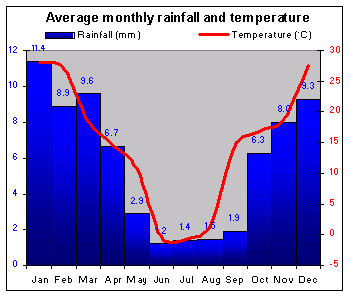COUNTRY INFORMATION |
Introduction |
A mountainous and landlocked country entirely surrounded by South Africa, Lesotho is economically dependent on its larger neighbor. However, Lesotho is beginning to benefit from the export of energy from the recently completed Highlands Water Scheme. Elections in 1993 ended a period of military rule, but South Africa had to send in its troops when serious political unrest erupted in 1998. |
|
Climate |
 |
Drought is often followed by torrential rain storms. Snow is frequent in winter in the mountains. |
|
People |
| Languages |
English, Sesotho, Zulu |
|
| URBAN/RURAL POPULATION DIVIDE |
|
|
|
The overwhelming majority of the population are Sotho, though there is a small community of European origin, as well as south Asian and Chinese minorities, which are active in the retailing business. Ethnic homogeneity and a strong sense of national identity have tended to minimize ethnic tension. The export of male contract labor to South African mines means that women head 72% of households; they also run farming, regarded by Lesotho men as "women's work." |
|
Economy |
| GNP (US$) |
1181
|
M |
GNP World rank |
150
|
|
| Inflation |
6 |
% |
Unemployment |
45 |
% |
|
StrengthsPotential of educated workforce. Boom in textiles and other manufacturing. Membership of SACU. Future revenues from water sales. WeaknessesDependent on South Africa. Weak agricultural sector. Loss of workers to mining in South Africa. Retail sector affected by sporadic disturbances. High unemployment. |
|
Politics |
| Lower house |
Last election |
2002 |
Next election |
2007 |
| Upper house |
Last election |
1998 |
Next election |
2003 |
|
The armed forces have been key political players in Lesotho since a bloodless coup in 1986. Although direct military rule ended in 1993, and a free and peaceful general election resulted in a sweeping victory for the Basotho Congress Party (BCP), the army maintained its powers over national security. Tensions between the army and the civilian administration escalated in 1994, when mutinous troops killed the deputy prime minister. King Moshoeshoe II was restored to the throne, and was succeeded by his son Letsie III in 1996. Accusations of vote rigging and mass protests greeted a general election win in 1998 by the LCD. After an attempted coup in September, the South African military intervened to restore democracy, brokering an agreement between the king and Lesotho's 12 parties. When elections were finally held in 2002, the LCD retained its majority. |
|
Resources |
|
|
| Oil reserves (barrels) |
No data |
Oil production (barrels/day) |
Not an oil producer |
|
The Highlands Water hydroelectric scheme has the capacity to supply all of Lesotho's energy requirements, as well as 63.3 cu. m (2200 cu. ft.) of water per second for South African use. Diamonds are mined in the northeast. |
|
Health |
| Life expectancy |
46 |
Life expect. World rank |
173 |
| Population per doctor |
10000 |
Infant mortality (per 1000 births) |
91 |
|
|
|
| Principal causes of death |
Tuberculosis, parasitic diseases, nutritional disorders |
|
Private health organizations and NGOs account for half of all health services. A government-operated flying doctor service covers the highlands. An estimated 25% of the adult population is HIV positive and life expectancy is declining. Food shortages in 2002 exacerbated the country's health problems. |
|
Education |
| Literacy |
83 |
% |
Expend. % GNP |
13 |
%
|
|
| PERCENTAGE OF POPULATION IN FULL TIME EDUCATION |
|
| Primary |
100 |
% |
Secondary |
32 |
% |
Tertiary |
2 |
% |
|
Lesotho has very high school enrollment levels and one of the highest literacy rates in Africa. |
|
Wealth |
| Cars |
6 |
per 1,000 population |
| Telephones |
10 |
per 1,000 population |
| Televisions |
16 |
per 1,000 population |
|
Social mobility is limited in Lesotho; the ruling elite keeps a tight control on power and wealth. Over 90% of the population live below the poverty line and many are migrant laborers.
|
History |
As Basutoland, Lesotho became a British Crown colony in 1884. - 1966 Independent kingdom.
- 1986 Military coup.
- 1990 King Moshoeshoe II exiled. Son installed as Letsie III.
- 1993 Free elections.
- 1994 Return of Moshoeshoe II.
- 1996 Letsie III succeeds to throne.
- 1998 New LCD wins polls. South Africa intervenes after coup attempt, and reconciles king and parties.
- 2002 Food emergency follows successive poor harvests. LCD wins long-postponed elections.
|
|